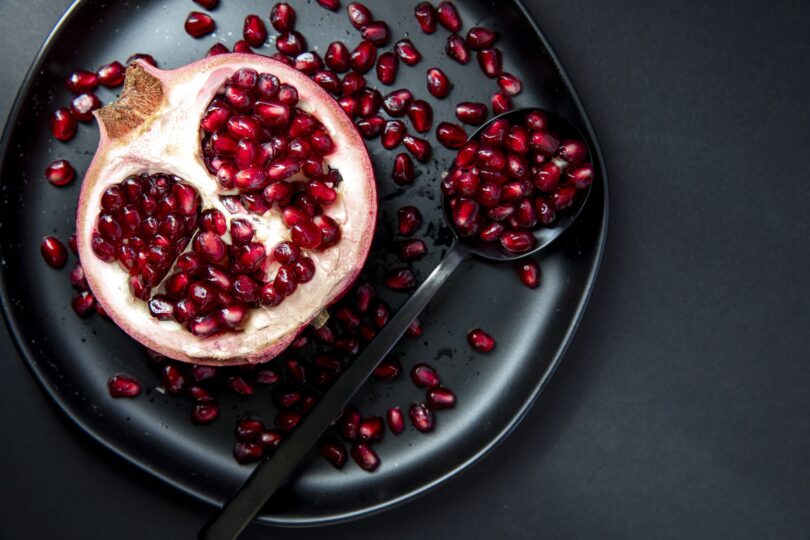Neslihan Koçak
A fruit that appears as a single entity, the pomegranate harbors juicy red kernels that are like a flavor explosion in the mouth.
The pomegranate tree is relatively small, growing up to 5 meters (16 feet). Its flowers, giving the tree its name with their pomegranate flower color, bloom in spring, and it bears fruit in the winter months.
One of the most well-known songs related to pomegranates frequently encountered in Turkish songs and folk music is “Nar Danesi,” composed by the famous Turkish folk poet Neşet Ertaş.
Pomegranates, especially grown in the mild climates of Mediterranean countries, are a significant fruit in many regions around the world. Research indicates that the vitamins and minerals found in pomegranates have preventive effects against various diseases.
Pomegranate cultivation is widespread, with major producers including Türkiye, India, Iran and China. In Türkiye, Antalya, Adana, Mersin and Muğla are prominent provinces for pomegranate production.
While pomegranate cultivation is not as extensive in other regions, it is practiced in all provinces of the southeastern Anatolia region.
Local varieties such as Zivzik pomegranate, along with Hicaz, Bori, Şekerek, Mayhoş, Barut, Urfa and Katina pomegranates, are cultivated in the region.
Zivzik pomegranates take their name from Zivzik Village, located in the Şirvan district, where they thrive. Known for abundant juiciness and a unique aroma, this healing fruit is highly favored by consumers in the domestic market.
An average Zivzik pomegranate weighs around 500 grams, and its seeds are roughly the size of chickpeas. Additionally, the seeds have a small and soft pit.
There are many beliefs and traditions associated with pomegranates.
In modern times, pomegranates can be seen on the coins of the ancient Greek city of Side, located in present-day Antalya. The Greeks were familiar with this fruit long ago, and it featured in many works of art.
Ancient Egyptians, on the other hand, viewed pomegranates as a symbol of wealth and ambition. According to the Ebers Papyrus, one of the oldest medical texts dating back to around 1500 B.C., the Egyptians used pomegranates in the treatment of tapeworms and other infections.
Today, pomegranates still carry powerful symbolic meanings. In some places, it is a tradition to present pomegranates as the first gift to the homeowner when a new house is purchased, symbolizing abundance, prosperity and good luck. Pomegranate-themed decorative items for homes are widespread and can be found in many home decor stores.
Pomegranate breaking is believed to bring abundance and prosperity to the upcoming year. Since cleaning pomegranates can be a bit challenging, they are often broken by throwing them on the ground in front of the door. The more scattered they are, the more it is believed that the abundance will be.
In Turkish culture, the pomegranate is a frequently encountered motif and is practically indispensable in Turkish cuisine. The labor-intensive process of making pomegranate molasses adds a unique flavor to salads. Pomegranate sherbet, fruit leather, Turkish delight, dishes cooked with pomegranate, stuffed vine leaves and much more – all showcase the versatility of this fruit.
Pomegranate is a key ingredient in the decoration of ashura (Noah’s pudding) and güllaç, a traditional Turkish dessert prepared during the month of Ramadan. In contemporary times, freshly squeezed pomegranate juice is commonly available in cafes and buffets during the winter months.
During the cold winter weather, enjoying a warm cup of pomegranate tea wouldn’t be a bad idea, would it? This tea not only delights with its slightly tart flavor and vibrant color but also facilitates the removal of toxins from the body due to its high vitamin content and antioxidant properties.
This tea offers various health benefits, including relieving symptoms of colds, aiding digestion, regulating blood circulation, and alleviating muscle and joint pain, among others.
The pomegranate is also considered a sacred fruit in Islam. In the Quran (Surah Al-An’am: 141), it is stated:
“Allah produces gardens both cultivated and wild and palm trees, crops of different flavors, olives, and pomegranates similar in shape, but dissimilar in taste. Eat of the fruit they bear and pay the dues at harvest, but do not waste. Surely Allah does not like the wasteful.” This verse highlights the diversity and benefits of fruits, including pomegranates.
It is commonly believed that the pomegranate is a celestial fruit, and one of its seeds or a drop of its juice is thought to come from the pomegranates in heaven.
Rich in vitamins, this fruit carries antioxidant and anti-inflammatory properties. Pomegranate is also a fruit rich in zinc, phosphorus, magnesium and iron, possessing medicinal qualities.
The seeds of the pomegranate contribute to keeping the skin youthful and enhancing its beauty with their content of vitamins, minerals and antioxidants.
Pomegranate seed oil can help prevent damage to your skin and contribute to rejuvenating it. Due to its ability to deeply penetrate the skin without clogging pores, this botanical oil provides thorough moisturization. Abundant in antioxidants, this oil may aid in boosting collagen production. Bioflavonoids, acting as a natural sunscreen, combat free radicals, protect your skin from sun damage and visibly delay signs of aging.
Courtesy: Dailysabah







